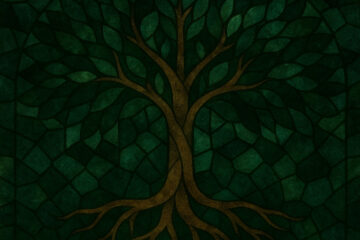How the Qur’an Rejects Patriarchy
This article is a structural reading of the Qur’an.
It does not argue for religion, doctrine, or conversion. Its purpose is to show how the Qur’an preserves the story of Abraham as a universal pattern of human awakening — a pattern in which every person must confront the inherited systems that claim authority over them.
The Qur’anic Abraham does not rebel against a parent.
He breaks a structure.
He exposes a false father.
He rejects patriarchy as an inherited authority.
And the Qur’an presents this break as necessary, not optional.
What follows is a refined, coherent article that keeps all Qur’anic verses fully intact while showing how the Qur’an itself rejects patriarchal inheritance and the authority of the past.
1. The Qur’an’s Story of Abraham Is Not About Family — It Is About Systems
When the Qur’an tells the story of Abraham, it is not concerned with biological genealogy. It is concerned with structures of inherited authority — with the forces that shape identity, bind communities, and demand loyalty.
The entire argument begins with a single name: Āzar.
This name appears only once in the Qur’an. It is not used to indicate biological fatherhood. The Qur’an uses the word ab, not walid. In Arabic:
- walid → biological father (from the root “to give birth”)
- ab → ancestor, authority, patriarchal figure, inherited tradition, cultural origin
This distinction changes everything.
When the Qur’an says “father” in the Abraham story, it is not naming a parent — it is exposing a system.
And Abraham challenges it openly.
“Tell them the story of Abraham, when he asked his father and his people, ‘What do you worship?’ They said, ‘We worship idols, and are constantly in attendance on them.’ He asked, ‘Do they hear you when you call? Do they help or harm you?’ They replied, ‘No, but this is what we saw our fathers doing.’
Abraham said, ‘Those idols you have worshipped, you and your forefathers, are my enemies; not so the Lord of the Worlds, who created me.’” (Q 26:69–78)
This is not a family conflict.
This is structural rebellion.
Abraham is rejecting:
- inherited belief,
- inherited obedience,
- inherited identity,
- inherited hierarchy.
He is rejecting patriarchy — the rule of the fathers.
2. The Qur’an Makes the Universality Explicit
The Qur’an refuses to let this story be confined to one ethnic group, one religion, or one moment in time. It teaches that truth cannot be inherited and identity cannot be owned.
“Were you there to see when death came upon Jacob? When he said to his sons, ‘What will you worship after I am gone?’ They replied, ‘We shall worship your God and the God of your fathers, Abraham, Ishmael, and Isaac, one single God: we devote ourselves to Him.’
That community passed away. What they earned belongs to them, and what you earn belongs to you: you will not be answerable for their deeds.” (Q 2:133–134)
This is a powerful correction of lineage‑based thinking.
The Qur’an says:
- You cannot inherit faith.
- You cannot inherit truth.
- You cannot inherit Abraham.
- You cannot inherit righteousness.
- You cannot inherit patriarchal authority.
There is no automatic transmission of spiritual identity.
The past does not own you.
You are accountable only for yourself.
This is the Qur’an’s first break with patriarchal logic.
3. The Qur’an Exposes False Fatherhood
When Abraham confronts his “father,” he is not confronting a parent. He is confronting a false fatherhood — a system that claims authority but has no truth in it.
This false fatherhood includes:
Before the Qur’an shows Abraham arguing with the system, it shows him testing its strength — and preparing to break it. The narrative builds tension:
“We gave Abraham his right judgement early on, and We knew him well. He said to his father and his people, ‘What are these images to which you are so devoted?’ They replied, ‘We found our fathers worshipping them.’ He said, ‘You and your fathers have clearly gone astray.’
They asked, ‘Have you brought us the truth, or are you just playing about?’ He said, ‘No, your true Lord is the Lord of the heavens and earth, He who created them, and I bear witness to that. By God I shall certainly plot against your idols as soon as you have turned your backs.’” (Q 21:51–59)
And then he waits… The system turns its back. The patriarchs walk away. The idols stand unguarded.
A structure built on inheritance is about to meet a man aligned with truth.
This is the moment before the shattering.
- ancestral customs,
- inherited distortions,
- patriarchy as unquestioned tradition,
- cultural expectation,
- social pressure,
- the emotional weight of “this is how we always did it.”
In the Qur’an, Abraham breaks with it entirely.
“Mention in the Scripture the story of Abraham. He was a man of truth, a prophet. He said to his father, ‘Father, why do you worship something that can neither hear nor see nor benefit you in any way? Father, knowledge that has not reached you has come to me, so follow me: I will guide you along a straight path. Father, do not worship Satan—Satan has rebelled against the Lord of Mercy. Father, I fear that a punishment from the Lord of Mercy may afflict you, and that you may become Satan’s companion.’” (Q 19:41–45)
The absence of a name here is deliberate.
The Qur’an wants the reader to recognize their own inherited authority in this “father,” rather than confining him to history.
Every society has an Āzar. Every person inherits a system that asks for obedience.
The Qur’an calls this system “father.”
And then shows you how to break it.
4. The Qur’an’s Own Proof: “Father” Means System, Not Biology
The Qur’an provides its own method of interpretation by repeatedly using the word ab (father) to refer to lineage, authority, and ancestral structures, not biological parenthood.
It uses “father” to refer to:
- great‑uncles (e.g., Ishmael),
- patriarchs of cultural memory,
- founders of communities,
- holders of tradition,
- systems of belonging.
Thus, when Abraham rejects his “fathers,” it is not a rejection of family but of structural oppression.
This is the Qur’an’s second break with patriarchy.
5. True Strength vs. False Strength: Āzar and al‑‘Azīz
Arabic roots reveal something profound here.
- Āzar → weak support, false strength, brittle authority.
- al‑‘Azīz → one of God’s Names: The Mighty, The Unbreakable, The Real Support.
One letter separates them.
One entire ontology separates them.
The Qur’an is teaching a structural lesson:
What appears as patriarchal strength is brittle.
What appears as surrender to God is real strength.
Abraham does not choose rebellion.
He chooses coherence.
He turns away from the brittle authority of “fathers” and toward the unbreakable support of al‑‘Azīz.
This is the Qur’an’s third break with patriarchy.
6. You Are Not Merely Allowed to Leave Patriarchy — You Are Required To
The Qur’an does not present Abraham’s break as optional.
It presents it as necessary.
Truth demands the rejection of inherited systems that distort reality.
And the Qur’an generalizes this beyond Abraham:
“He has chosen you and placed no hardship in your religion, the faith of your forefather Abraham. God has called you Muslims—both in the past and in this—so that the Messenger can bear witness about you and so that you can bear witness about other people. So keep up the prayer, give the prescribed alms, and seek refuge in God: He is your protector—an excellent protector and an excellent helper.” (Q 22:78)
“Muslims” here does not mean a later religious identity.
It means: those who stand in conscious surrender to the Truth.
This is rooted in the Arabic root S-L-M, which carries the meanings of wholeness, peace, safety, alignment, and becoming unbroken. From this single root come:
- salām — peace, wholeness
- salāma — safety, soundness
- islām — entering alignment, surrendering distortions
- muslim — one who aligns, one who yields to truth, one who enters wholeness
In this sense, a muslim in the Qur’anic worldview is not a member of a later religious category, but anyone who enters this state of alignment.
The Qur’an’s message is clear:
You are responsible for your own alignment.
You cannot outsource conscience to ancestors, traditions, or systems.
This is the Qur’an’s fourth break with patriarchy.
7. The Qur’an Rejects Patriarchal Ownership of Truth
The Qur’an rejects every attempt to monopolize Abraham or truth itself.
Some claimed they inherited Abraham.
Some claimed exclusive lineage.
Some claimed authority because of ancestry.
The Qur’an rejects all of this.
Truth is not inherited.
Truth is chosen.
And the Qur’an makes this rejection explicit in Abraham’s own words:
“Abraham said, ‘Those idols you have worshipped,
you and your forefathers, are my enemies;
not so the Lord of the Worlds, who created me.’” (Q 26:76–78)
This is a direct dismantling of patriarchal entitlement.
Abraham is not only rejecting the idols —
he is rejecting the authority of lineage itself.
Your fathers are not the truth.
Your forefathers are not the truth.
Your inheritance is not the truth.
Only the One who created you holds authority.
This is why the Qur’an continues:
“That community passed away. What they earned belongs to them, and what you earn belongs to you.” (Q 2:134)
No past generation owns the present.
No ancestor can dictate conscience.
No system has permanent authority.
This is the collapse of patriarchal ownership of truth.
8. The Final Logic: Real Fathers Are Chosen, Not Inherited
In the Qur’an, the real father is not the one who gave you blood.
The real father is the one who gives you truth, orientation, and coherence.
Thus the Qur’an calls Abraham:
“your father” (Q 22:78)
—not because of biology,
but because he is the origin pattern of surrender to truth.
Abraham is the father you choose, not the father you inherit.
And this is the Qur’an’s final break with patriarchy.
Conclusion: The Qur’an’s Patriarchy Break Is a Pattern for Today
One final pattern must be stated plainly: the Qur’an never refers to God as “Father.” Not once. This absence is intentional. By refusing father-language for the Divine, the Qur’an dismantles the deepest root of patriarchal authority — the projection of male lineage onto God. The Divine Names emphasize mercy, presence, nearness, justice, and truth, but never fatherhood. This opens the door the next piece on al‑Raḥīm, whose root (R‑Ḥ‑M) is tied to the word for womb — a radically different vision of divine origin, care, and creation.
The Qur’an presents Abraham’s break with his “father” as the template for every awakening:
- Recognize inherited distortion.
- Reject false authority.
- Choose truth over tradition,
Abraham was truly an example:
devoutly obedient to God and true in faith.
He was not an idolater; he was thankful for the
blessings of God who chose him and guided him to a straight path.
We gave him blessings in this world, and he is among the righteous in the Hereafter.Qur’an 16:120-123


0 Comments